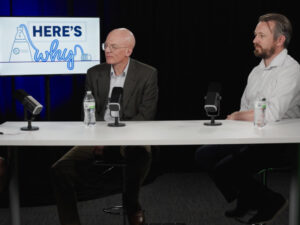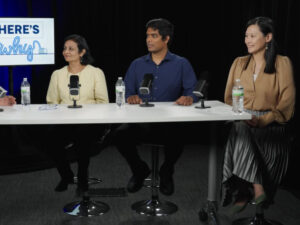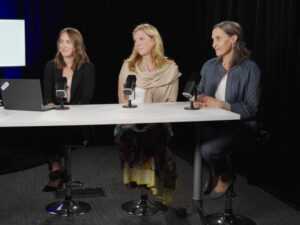The ‘Here’s Why’ Podcast: Science We All Should Know
‘I don’t want to be in a world where we stop teaching science’
Megan O’Keeffe, a former science teacher who now works as a senior education specialist at ULRI’s Office of Research Experiences & Education (OREE), shares a sentiment often expressed in UL Research Institute’s (ULRI) Here’s Why podcast series now available on Apple, Spotify, and YouTube. It’s an idea suited to our times: Solving humanity’s complex problems requires curiosity and scientific reasoning.
Introducing Here’s Why: Exploring the scientific foundations of modern life
Hosted by Kristen Delphos, vice president of Communications and Public Affairs at ULRI, Here’s Why features expert guests from within our research institutes and offices, and some of the best and brightest minds in the safety science community to take you behind the scenes and into the science informing the most common standards, regulations and safety advice on products you use every single day.
Episode 1: Science in Schools Is More Important Than Ever … Here’s Why
In Episode 1, titled “Science in Schools Is More Important Than Ever … Here’s Why,” Kelly Keena, Ph.D., senior director of ULRI’s Office of Research Experiences & Education (OREE), sets the context for the podcast series. For society to progress, children must learn basic scientific principles beginning in elementary school, Keena says, since it’s the only way to inspire the next generation of engineers and researchers.
Episode 2: Airlines Ask You About Lithium-Ion Batteries … Here’s Why,
In Episode 2, titled “Airlines Ask You About Lithium-Ion Batteries … Here’s Why,” Judy Jeevarajan, Ph.D., vice president and executive director of ULRI’s Electrochemical Safety Research Institute (ESRI), exemplifies the goal of the podcast series by breaking down complex topics in a concise and simple way. She explains the concept of “thermal runaway,” which happens when lithium-ion batteries found in everyday products — from smartphones and laptops to flashlights and e-bikes — overheat or are crushed.
Episode 3: Materials Matter in Our Climate Change Fight … Here’s Why
On this episode, we’re talking about materials and why they matter. Everything that goes into making our everyday products is sourced from a variety of different places. How we source those materials is an important step in building our sustainable future. Our guests today are not only focused on new materials discovery, they’re also focused on efficiencies, reducing waste, and lowering manufacturing costs, all in the name of combating climate change.
PUBLISHED



